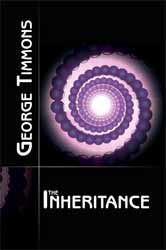|
Click here to return to the main site. Book Review
Through a shuttle accident John More finds himself flung into the far future, where society has changed beyond all recognition. After another Dark Age, the cities have been abandoned and although Mankind has retained, and even improved upon his technology, life is now based around smaller self-sufficient communities. But can a man from 2058 adjust to the world of 4048...? The Inheritance is a first time novel from George Timmons, although he has previously published academic work in the area of Education and was one time lecturer at Warwick University. Since his retirement he has worked for Insight, a Christian Counselling organisation in Leicester. Authors who use the structure of novels to put forward their own idea of how to run a Utopia are nothing new, neither are books, which have an agenda, disguising themselves as stories and what we have here fulfils both categories. Books of this type have existed for thousands of years and produced some classics both in political/religious thought such a Plato’s Republic (360 BC) and Thomas More’s Utopia (1516) and as novels, like Aldous Huxley’s Brave New World (1932) and whilst I could not say that Timmons's book is up to this standard at least it has something to say. In many ways it is the descendant of More’s Utopia where the past is juxtaposed on the present, or in this case the future, to highlight the advantages of religious tolerance and discipline to a well ordered society. Thankfully none of the authoritarian aspects of More’s work is utilised by Timmons. Timmons uses his main protagonist, John More, as a sort of everyman whose function is to question the underlying beliefs which have generated the society in which he finds himself, though as the dust jacket proclaims that the content is about ’what life could be like if we followed the original teachings of Christ’, you just know he is little more than a convert in waiting. Where the book falls down is not in its theology, after all Christianity has been around for a while now, no, where the book falls down is as a science fiction novel. After his arrival in 4048 the first part of the book is part history lesson, part assessment of their educational system and part examination of their way of life and its underlying belief system. What follows is a bit of a Dickensian travelogue as he journeys across country only to return to what is the conclusion of the novel. All very thought provoking I’m sure, but also a little on the dull side as page after page about theology and education sap any excitement that may have existed in the story. The romantic love story is scant and unconvincing and whilst the dust jacket may proclaim it to be an exciting science fiction adventure, it turned out to be anything other than this. Both H. G. Wells in The Time Machine (1895) and Olaf Stapledon’s Last and First Men (1930) showed that this sort of story can work well, however, Timmons is so intent on getting across his ideas that he has failed to pay sufficient attention to either the plot or character development. Although it is a personal choice, and I’m sure that there would be many who would disagree, the picture that he paints of his future utopia is dull in the extreme. Everyone is so reasonable, nothing really happens and the people with whom he populates it are portrayed in such a way as to be almost passionless. It is interesting to note that the book only really picked up when More is accidentally dropped into the new Dark Age. Ultimately, this is a valiant attempt to create something with a message; unfortunately it is the focus on the message that stops Inheritance from being a good science fiction novel. 5 Charles Packer |
|---|

